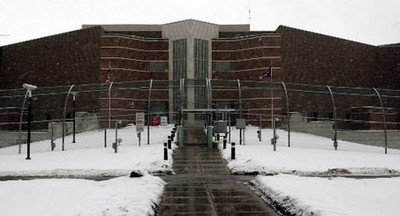This report is on the conditions at California State Prison - Corcoran
4A SHU (CSP-COR). It is written with the purpose of sharing with
comrades locally and nationally the demise of the movement here at
CSP-COR, and what will be necessary for comrades of the United Struggle
from Within (USW) to regain momentum uniting those capable of being
united in the struggle to abolish the Security Housing Units (SHU).
The author has been housed at CSP-COR SHU on an undetermined SHU
sentence that resulted from a battery on a peace officer with serious
bodily injury. This was an event orchestrated by Kern Valley State
Prison’s corrupt guards. Any prisoner who has been somewhere within the
California prison system knows the history of CSP-COR and the high
degree of guard corruption; everything from murder and police brutality
to conspiracy against prisoners for complaining against officials. Here
at CSP-COR I’ve personally witnessed staff abuse the power bestowed upon
them by California and its California Correctional Peace Officers
Association (CCPOA) union for the purpose of keeping their foot on
prisoners’ throats and preventing our freedom of speech.
There is a code of silence practiced by the majority of staff at
CSP-COR, dubbed the Green Wall, and it’s alive and well here in 2012.
Where once it was isolated to those in green (correctional officers) it
has now spread to those within the medical department (nurses, doctors,
and psych staff), the legal library, the mail department, the food
services department, and the religious department. This is not to say
that every person who works for the CDCR is a part of the Wall; there
are individuals who can be used to expose the system for what it is. But
the state’s institutions seem to be uniting its forces more these days
against prisoners for the sake of covering up the problems and sweeping
important social issues under the rug.
On 4A, the law librarian prevents any access to his facility unless a
prisoner has a deadline from the courts or a state. The prison law
library is the most important resource for prisoners, providing
literature that guides the ability of prisoners to more effectively
prosecute cases in the judicial branch of this government. Prisoners
need things like computers, copies, typewriters, reference material,
etc. The CCPOA knows this and take away prisoners’ access to one of the
most important resources they have through understaffing and budgeting.
Political power in the hands of prisoners presents a threat to the
financial security of every vampire of the U.S. prison complex. And
because it is not only a possibility but also a social reality, the
state and the union seek to stall the success of the prison movement,
particularly in the area of free speech, free assembly, and right to
grievance which becomes free protest.
I’ve also witnessed officials censor prisoners’ mail because the
contents of the correspondence or periodical didn’t sit well with the
agenda or idea of the state-union establishment. Often a pig in the
position of sorting incoming/outgoing mail is issuing, withholding, or
completely disposing of a prisoner’s mail for malicious reasons.
Brothers at Corcoran SHU have a difficult time just corresponding with
the outside world. Officials with their personal vendettas, and most
times negligence, confiscate materials such as stationary packages sent
to a prisoner from their family. They then turn around and try to trade
the material with another prisoner who has filed a grievance against
them in exchange for the prisoner’s silence on the subject of the
grievance.
They trash mail that may expose the reality of the state-union
corruption. Most times they secure the support of the public by
declaring the “security” threat as a threat to the public. But if the
matter was placed under the microscope where the real public could hear
and see the position of prisoners, they’d be forced to recognize that
the blood of prisoners are on their, the public’s, hands.
California uses a department regulation 3135(c)(1) in order to validate
censorship practices in its prisons holding that the material is “…of a
character tending to incite murder, arson, a riot, or any form of
violence or physical harm to any person, or any ethnic, gender, racial,
religious, or other group.” Most times, though, this isn’t even the
case. It isn’t the security of the public that is at stake, it is the
financial security of the labor aristocracy that is at stake.
After the
Pelican Bay
State Prison (PBSP) hunger strike prisoners received a number of
small concessions from the state. Here they’ve already begun to renege
on their deal. They allow brothers to wear their personal kicks and at
times purchase new kicks. There are clear color pen fillers on the
store, beanies are issued in the winter, and someone from the psych
staff walks around once a week and passes out a sheet of paper with
eight to ten puzzles and a calendar for the Jewish month. But CSP-COR
officials don’t even recognize the elements with the most material
substance of the PBSP core demands. There is no group yard, the cages do
not have pull up bars, and the ab-roller equipment that was issued has
been banned. The canteen has not been expanded, there haven’t been any
added TV stations, and prisoners still can only receive one package per
year.
The guards are banning Prison Legal News and MIM(Prisons)
publications, but allowing religious periodicals like the
Trumpet. Any attempts by prisoners to come together to figure
out how to curb such BS is interfered with by means of vandalizing cell
inspections, shortening food rations, confiscation of
property/privileges, and bogus rule violation reports. Take, for
example, an event that occurred where various Special Needs Yard and
Disciplinary Detention prisoners of Black, white, and Latino nationality
were on the cage yard exercising together, calling out their routine in
cadence to coordinate the exercise routine. The yard pig approached the
group and interrupted their exercise stating they’d have to cease the
group work out as it was gang activity. The prisoners objected asking,
“was the Marines a gang?” The pig wouldn’t answer, so they continued
exercising. The pig called the building where these prisoners were
housed and instructed 4 coworkers that the prisoners involved in the
exercise routine were to have their cells vandalized.
This is a brief description of the abuses taking place at CSP-Corcoran.
There are a few class actions being initiated and a certain USW comrade
is organizing prisoners (peacefully) around a campaign to oppose mail
censorship. The USW comrade said it all started with CSP-Corcoran
censoring MIM(Prison)’s correspondence.










